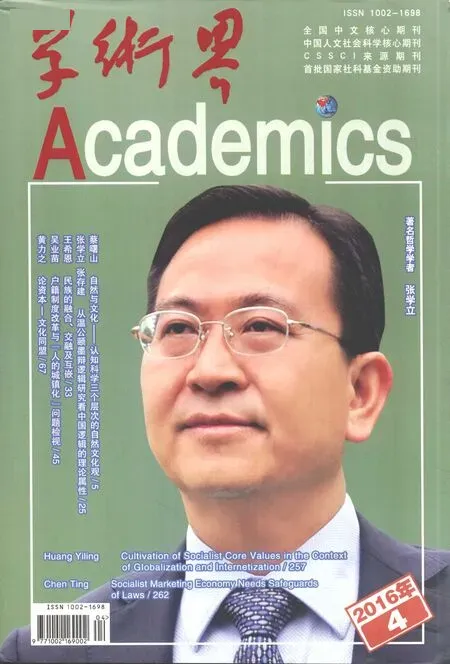學(xué)術(shù)界
- 自然與文化〔*〕
——認(rèn)知科學(xué)三個(gè)層次的自然文化觀 - 從溫公頤墨辯邏輯研究看中國邏輯的理論屬性〔*〕
- 民族的融合、交融及互嵌
- 戶籍制度改革與“人的城鎮(zhèn)化”問題檢視〔*〕
- 傳統(tǒng)國家治理觀念框架的近代轉(zhuǎn)型與困境
——以《大同書》和《周禮政要》產(chǎn)生的語境為例 - 論資本
—文化同盟 - 個(gè)人主義與人的社會屬性〔*〕
——預(yù)立指示制度的法理闡釋 - 網(wǎng)絡(luò)謠言界定及法律規(guī)制〔*〕
- 公共文化服務(wù)網(wǎng)絡(luò)的建構(gòu)與治理〔*〕
- 《奇跡》是一首現(xiàn)代情感的“無題”詩嗎〔*〕
- 莫言小說的罪感和罪感困境〔*〕
- 自由個(gè)性的積極張揚(yáng)
——梭羅文學(xué)作品的政治哲學(xué)基礎(chǔ) - 晚明書畫消費(fèi)與士大夫的身份危機(jī)
- 宋代山水畫的理學(xué)意涵〔*〕
- 從“現(xiàn)實(shí)生活”出發(fā)〔*〕
——馬克思“兩個(gè)手稿”的資本批判視角 - 仁愛思想是我國傳統(tǒng)價(jià)值觀的精華
- 《列子》的“化”:本體設(shè)定與具象過程〔*〕
- 中原傳統(tǒng)音樂中的淮上特色〔*〕
- “音樂認(rèn)同”:一種哲學(xué)人類學(xué)解讀
- 清末民初時(shí)期關(guān)于國家理性和個(gè)人理性的論辯
——評梁啟超憲政思想發(fā)展的兩個(gè)主題 - 自由農(nóng)民與農(nóng)業(yè)革命
——英國東盎格利亞地區(qū)的圈地運(yùn)動和農(nóng)業(yè)革命 - 《自由大憲章》:拉丁語開啟的歷史語境
- 產(chǎn)業(yè)鏈環(huán)境責(zé)任及其驅(qū)動機(jī)制〔*〕
- 政策性農(nóng)業(yè)保險(xiǎn)合同的解除制度〔*〕
——以利益均衡為視角 - 向公民負(fù)責(zé):西方“責(zé)任政府”的歷史變遷
- 〔學(xué)界薦書〕
- 〔學(xué)術(shù)信息〕
- 廣東財(cái)經(jīng)大學(xué)
- Cultivation of Socialist Core Values in the Context of Globalization and Internetization
—— from the Perspective of Cultural Consciousness〔*〕 - Socialist Marketing Economy Needs Safeguards of Laws
- Why “Double Engines”?On the Economic Effects of Public Investment
- China’s Cultural Industry Development in the Era of Globalization
- Emergence and Development of Imperial Culture School under the New Trend of Cultural Globalization
- Comparison of Effects of Cultural Characteristics on Cultural Epochal Character between China and Europe
- Comprehensive Innovation Path of Marxism-Leninismin China in the Postmodern Cultural Context
- Later Wittgenstein’s Rule-following Paradox and Chinese Philosophy of Meaning
- Reforms and Breakthroughs of Post-new Public Management Presupposed Rational Construction Brought by ICT
- The Taoist Ecological Ethics Concerning Animal Protection
- Contemporary Value and Educational Enlightenment of Zhu Xi’s Moral Education Thoughts
- The Value of Moral Education Thought of Mohist School for the Cultivation of Sense of Social Responsibility of Young Students

